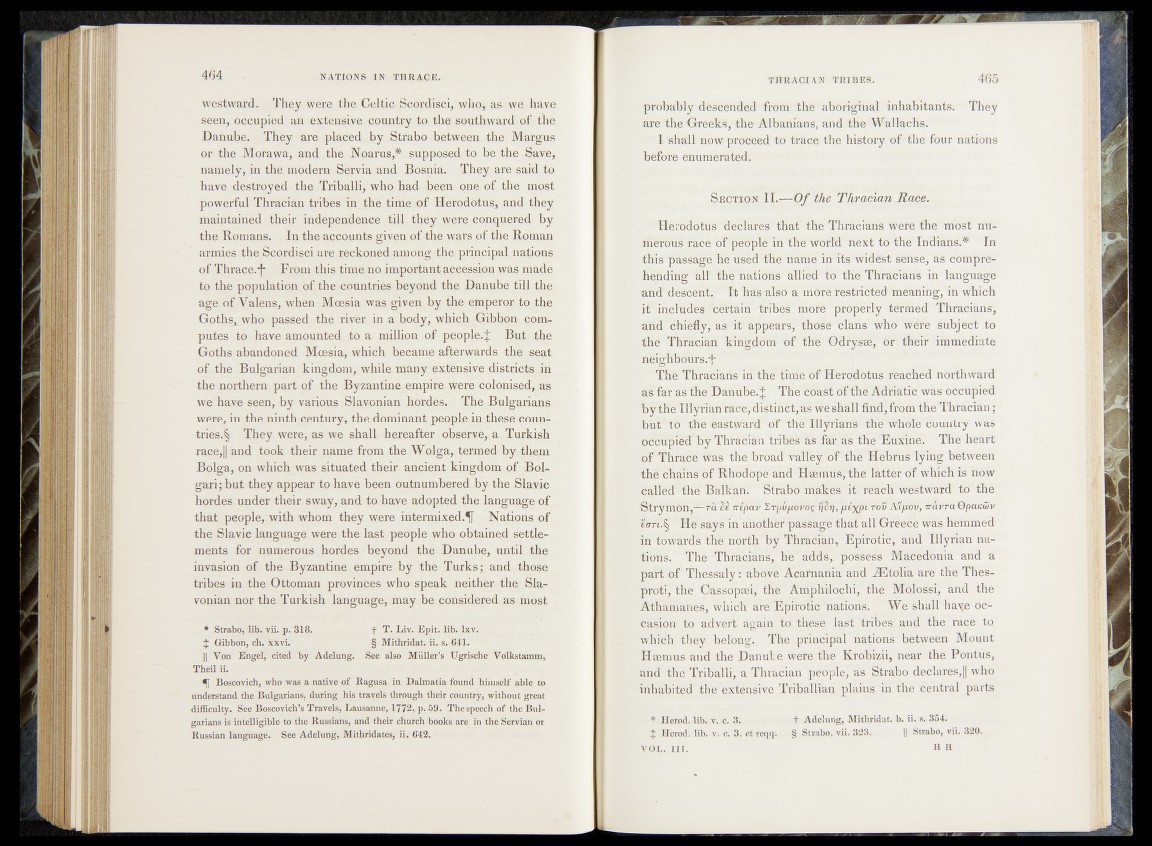
westward- They wer# the Celtic -pcor^sci,, who,, as-we have
seen, occupied an extensive country to the southward oil the
Danuber They are placed j-by^ Straho betweem^ej Margus
or- the Morawa, and the Noarus,* supposed to be.jthe .Save,
namely, in the modern Serna and Bosnia. Theyf>arej§§ij^to
have destroyed the Triballi, who had been one, of tl^ rnq§t
powerful Thracian tribes in .the time of Herodotus, and,they
maintained their independence till they, wenecQnquqrgd by
the Romans; In th^accbunia giyen of -the wars ,of«;th’e Roman
armies the Scordisei are reckoned among fhe principal nation s
of Thrace.*|* From this time no important a?e$§s|ipn?was ,made
to the population, of the countries beyond thg Danube till the.
age of Valens, when Mcesia was given, by the emperqr to the
Goths^who passed the river in a body, whigh Gibbon com-
putcs to have amounted to a, million of ppppVe^J; But, the
Goths abandoned Mcesia, which became afterwards the -seat
bfJlfe Bulgarian kingdom, while many extensive districts. jn_
the northern part of the Byzantine empire were colonised, as
we have seen, by various Slavonian hordes.; The Bulgarians
were, in the ninth century, the dominant peopWiJJthese coun-
tries.§ They were, as we shall hereafter observe, a Turkish
race,|| and took their name from the Wolga, termed by them.
Bolga, on which was situated their ancient kingdomjof ,Bol-,
gar i; but they appear to have been- outnumbered by the f’Slayac
hordes under their sway, and to have adopted the language of
that people, with whom they were intermixed.^ Nations of
the Slavic language were the last people who obtained settlements
for numerous hordes beyond the Danube, until ttfjji;,
invasion of the Byzantine empire by the Turks; ancLthoge
tribes in the Ottoman provinces who speak neither the Slavonian
nor the Turkish language, may be considered as most
* Strabo, lib. vii. p. 318. f T. Liv. Epit. lib. lxv.
J Gibbon, ch.xxvi. § Mithridat. ii. s. 641.
|| Von Engel, cited by Adelung. See also Muller’s Ugrische Volkstamm,
Theil ii.
Boscovich, who was a native of Ragusa in Dalmatia found himself able to
understand the Bulgarians, during his travels through their country, without great
difficulty. See Boscovich’s Travels, Lausanne, 1772, p. 59. The speech of the Bulgarians
is intelligible to the Russians, and their church books are in the Servian or
Russian language. See Adelung, Mithridates, ii. 642.
probably descehded1 from1 t'fete ‘aboriginal inhabitants. They
are the Greeks, the Albanians, and the Wallaehs.
^ I-snail wow proofed tb trace' the history of the four nations
before enumer’iitdefef'1'
pE^lgfikfll.— O f the Thracian Race.
H eVodotiisHeclares tha^^he THiacians werenra'b most nu-
wefoiis ¥&ce the Wbfld^g^^F w-thd'Tndians.# In
'lil^aSiPlne’' ira fh e ^ 1!t^Wia£st serose, a£ cbmpre-
“hendthg" a ir f alt-rea^to m f Thra<?iaffile'in lan^riagb
«and' ae'sce'nt.^ It hl&Mso- ,mefnin^ in' which
-it oncl ucfe s•o&^am trib"fe^niOTO?,propwW 't^fhed Thracians^
and ihiefly/as' if Wnjeftt to
the Thracian kih‘g|lbm q fT l# their “immediate
The T h ram a^m ’the* HeiwuWS^afcnM^ northward
asfafr a sm e B a i f f iS TH # ^ ^ r ^ ^ h eA d r ia tm W^ncfehpied
byfhesfuyrran'1r t^ ^ d f f ti^ t,^ ^ ^ s lia l’l find, from the Thftfcihn'f
b u t1 i<31 the-’eS^fwaird b r the Illyrrems* thewhole'cduntry was
bccupied'by Thracian Irilfelms mr as th e^u ian e . The heart
of'Thrace Ws ’ the broad' vatle^bTfhfe Hebrusfymg
fe^cn^ih^of Rhbdbpe and H a m ^ W l r a i of which how
called-tHEs Balkan.' fettabo makes“4 it reaehfwelaward ler the
Strymbn,— ra oe ttipav ^r^fioy&ff^^,il{^invWrp^,va'vra Qpaic&'v
•iofi!§ He says in another passagethat aiFGW e^w ^ sfem m ef
in T h i r d s the north mv Thracian, Epirbfrcf '‘afhcl Illyrian nations.
‘ The Thrac^hs^he1 a d d s f ? p ^ f ^ ^%^^tced!ohia, and a
jjatt of Thessaly: abWe Acatnania and iEtdfia are the Thes-<
proti, the/Oassopaei, the Ampniloehi, ^tfhe M'dTossg in d the
Athamanes, vidiich^are EpiroWjfiarions. We lhall ha^e occasion
to advert' ajlaln td^hekb last tribj^,and the race to
which they belong.' The principal nati©'® metween Mount
H m m u s^ d the Danufce^tvdfe the Krobizii, near the Pontus,
and the Triballi, a Thracian peBple, ak Strabo declares,|| who
inhabited the'extensive Triballian plains in tMIf central parts
♦ Herod, lib; V; C. 3* + Adelung, Mithridat. b. ii.«. 354.
Herod, lib; v. c. 3. et seqq. ... § Strabo, vii.. 323. Strabo, vii. 320.
VOL. III. H H